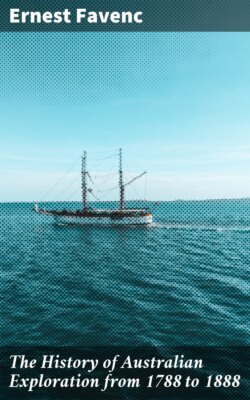Читать книгу The History of Australian Exploration from 1788 to 1888 - Ernest Favenc - Страница 20
На сайте Литреса книга снята с продажи.
Оглавление"The claims of the English have no fixed boundaries; they seem desirous of confounding the whole of New Holland under the modern name which they have given to the east coast, which was minutely explored by Captain Cook. It is worthy of remark that the French geographers had, from a comparison of the tracks navigated by Abel Tasman, previously concluded on the existence and direction of this coast itself."
But neither Dutch nor French claims were ever seriously advanced, and the whole of the continent and adjacent islands were ceded to the English in much the same happy-go-lucky fashion that we recently let slip a large portion of New Guinea. One cause of the apathy displayed was without doubt the forbidding nature of the reports published by all the navigators. The coast line had been examined, and the various inlets followed up without any important or navigable river having been brought to light, and the absence of fresh water streams in such a large continent naturally led thinking men to the conclusion that the inland slope was nothing but an arid desert, parched beneath a rainless sky. The hot winds that had been experienced on the southern coast aided this belief, and the natives when interviewed professed no knowledge beyond the limits of their tribal hunting grounds. The little colony clustered around Rose Hill, and on the shore of Sydney Cove, was shut in by the gloomy gorges and unscaleable precipices of the Caermarthen Hills, that stayed all progress to the westward, and the same frowning barrier had been found to extend north and south.
Men's imaginations were exhausted in picturing the physical appearance of the mysterious interior. Some thought it a vast level plain, where the few and sluggish rivers were lost in shallow lakes, to disappear by evaporation; others again, believed it to be an immense bed of sand where no rivers formed, and the thirsty sands absorbed the scanty rainfall; and many imagined an inland sea connected with the ocean by subterranean outlets: one and all agreed in its inhospitable nature.
There was nothing hopeful nor inspiriting in the outlook to induce men to attempt to penetrate this silent desert, save the love of adventure, and the gratification of a laudable curiosity.
The convicts, who in efforts to regain their liberty, from time to time made desperate attempts to escape, either perished miserably or, daunted by the sterile nature of the land and the hostility of the natives, returned to give themselves up, before reaching any distance from the settlement. The work of exploration was toilsome and difficult, from the lack of beasts of burden. Each member of the party had a heavy pack to carry, and when to that was added the cumbrous firearms and ammunition of those times, a day's journey was no light labour. The weary system of counting the paces all day must have considerably added to the monotony of the march. Two thousand and two hundred paces over good ground were allowed to a mile. When too, nature had barred the way with an apparently insurmountable range, it is not to be wondered at that the area of explored country was not very widely extended during the first twenty years of settlement.
In striking contrast to other portions of the world's surface that have been slowly explored and examined by the European nations, Australia has throughout retained a character of its own. From the coastal formation of most lands, fair indications could be obtained of the character of the interior. Large rivers gave evidence of a defined system of drainage, the crests of snow-topped mountain ranges in the distance were proof of whence these rivers sprang. The native tribes were of higher intelligence, had a partial knowledge of what lay beyond their immediate ken, and could show articles of barter and commerce that they had obtained from more inland residents.
Australia was a silent and sullen blank, and for a century of exploration nature has resisted, step by step, the encroachments on her stronghold, making the invaders pay toll with many a gallant life.
